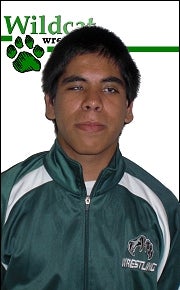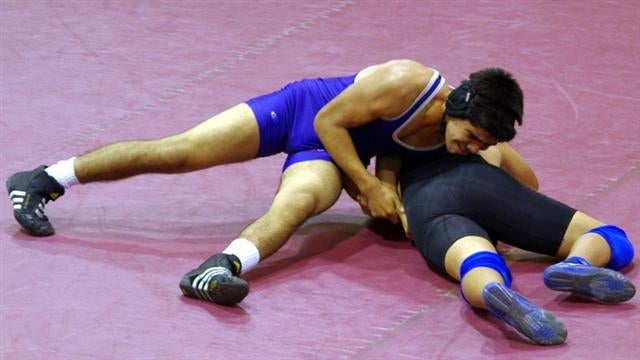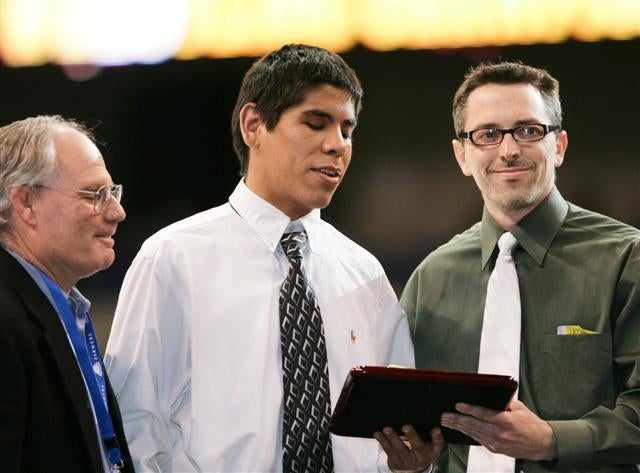James Magana took the award from his wrestling coach, Daren de Heras. It was heavier than he expected. He heard the crowd's applause, his teammates yelling his name above the din of cheers. This wasn't a high school gym, but Rabobank Arena in Bakersfield. These weren't classmates, but peers in his sport. This wasn't a dual meet against La Canada, this was the California State Wrestling Championships. He was nervous and excited at the same time. He had never felt a spotlight so bright, standing among some of the best high school wrestlers in the state and the nation. He looked into the stands to soak in this once-in-a-lifetime moment: "All I saw was a gray blur."
Often, it's all he ever sees. 
James Magana.
Photo courtesy of Monrovia High.
He held the plaque upside down as photographers snapped away for a few moments. Against stereotype, the 17-year-old junior from Monrovia (Calif.) showed that he can do what others can't, or won't. Even though he is legally blind.
Run a marathon? Magana finished ahead of half the field at the 2009 Long Beach Marathon. He completed it in 4 hours, 35 minutes, 17 seconds, which, because of his disability, qualified him for the Boston Marathon.
"One is enough for me," Magana says. His direction was guided by the footsteps of those around him. Some runners can zone out and just run. Magana must concentrate with every awkward stride. Twenty miles into it, his steadiness of pace caught two of his faster teammates, and they ran the last six miles together.
Go out for the wrestling team? How can a guy wrestle when he can't see the hands or arms of his opponent, when anything closer than five feet is a blur, anything farther is a phantom? Yet Magana won 20 and lost 15 during his second season of wrestling. He placed at three tournaments, finished third in the Rio Hondo League and qualified for the CIF Southern Section Central Division meet at 140 pounds, where he went 2-2 and pinned an opponent who had previously beaten him badly.
Still, he doesn't think he did that well, but that's not the point. That he inspired others was the point. And on that, he has been spectacular.
What the mother saw
Johnny Magana watched as her son's name was called, as he ascended the stairs clutching the shoulder of his coach, so that he could receive the Cullen Fitzgibbons Award for being the most inspirational wrestler in the state. Her Spanish accent is heavy: "I see a boy go through different things. I feel so proud of him. It's very emotional for me to watch him. I feel like I am going to cry, but I stopped. I feel very proud to be his mom. Sometimes I complain to God about his vision, but that day I didn't. God has different plans."
James Magana was born with congenital coloboma, a condition in which the eye doesn't fully develop. He lives in a tule fog, but sees ill-defined shapes and color in his left eye, with moments of varying crispness out of the corner. He and his mother moved from Oceanside, where he attended El Camino (Oceanside, Calif.) as a freshman, to Monrovia. Johnny Magana accompanied James to meet the wrestling coach. She and her husband had encouraged James to compete in sports and now they were going to try to make it happen.
Coach Daren de Heras was fine with it. All Magana had to do was put in the work. His skills didn't really matter. But as he put in the time, especially in the weight room to build the strength that could help offset his handicap on the mat, he dropped 20 pounds. Without attracting attention to himself – he didn't even have a scale at home – he continued to wrestle at 160 pounds on the junior varsity. It didn't matter. He did what he was told and wasn't going to complain. Besides, now he had people around him.
"Before I wrestled, I was alone," Magana says. "I didn't have a social life, I was quiet, shy. Once I started wrestling, I came out of my shell. I started getting more vocal with classmates, other people. It boosted my self-confidence a lot. I have a connection with other people now. I'm not as shy.
"I can take what I learn here and use it in my regular life, through college, getting a career."
He wants to do something using math, perhaps accounting. 
Magana was 20-15 on the mat during his junior season.
Photo courtesy of Monrovia High School.
Jose Magana, his eyes glazed over by cataracts since birth, pictured the moment as he stood next to his wife. The sound and emotion in the cavernous room painted the canvas in his mind. Without ever seeing the stage,he saw his son's smile: "I could picture the expression on his face and the coach's face, and all the people that were there. I could hear the emotion. You could feel it in your body. They were real happy and they had expressions of pride. I knew that other people were feeling the same that I was feeling."
Jose Magana had wrestled, too, for Temple City (Calif.), and been league champion as a junior in 1984. "Jose was a stud," recalls Jerry Lawrence, his coach at the time.
Magana also played for the U.S. National Paralympics goalball team, and it took him to Canada, Mexico and Europe. He has spoken to officials at the Olympic Training Center about James wrestling in the Paralympics. On the day James received his award, father and son sat in the stands together, watching the wrestling in front of them. They couldn't see it like those around them, but they could feel it.
"There are a a lot of people out there who put themselves down instead of thinking positive," Jose Magana says of the visually and otherwise impaired. "They think negative about themselves. James is always thinking positive, willing to try."
How positive, how willing? After the Long Beach Marathon, de Heras has considered his next adventure, a 1.5-mile swim from Alcatraz Island and a seven-mile run. Magana said he was willing to try. "One of the guys told him there were sharks in the water," de Heras recalls, "and James said, 'I won't see them.'"
What the teammate saw
Jimmi Bacus and three teammates sat in the second row of the stands, about as close to the stage as they could get without having a VIP pass: "I saw one of my good friends getting an award he deserved more than anybody else. How often do you see someone get what they deserve?"
When Magana wrestles, opponents must maintain contact with him at all times, which takes away the strategy of diving for his legs. If contact is broken, they restart from the opening position. It has led de Heras to focus on teaching Magana a style that is different from other wrestlers, a lot of compact moves, pushing, pulling, arm drags. It's a strange world, grappling in a haze.
To get a feel for what his new teammate was going through, Bacus put on a blindfold and wrestled Magana. It was eye-opening. "It was an insane experience, out of this world," says Bacus, who had a 25-pound weight advantage and is a two-time league champion. "I had the hardest time. The first 10 minutes he was beating the crap out of me.
"If he had his sight, then he probably would be one of the best wrestlers in the state. He has no fear whatsoever. He just takes everything on."
The award that Magana received was named after Cullen Fitzgibbons, a wrestler at Los Alamitos (Calif.) with Down Syndrome who went 0-28 for his four-year career, yet touched everyone he came in contact with.
Magana touched people, too, with his humility and businesslike approach on the mat in both victory and defeat. "In all my years, I've never seen so many coaches go out of their way to shake a person's hand, and I don't believe it was just because of his handicap," de Heras says. "It was his character. You never saw him complain, never got rattled or upset. He would pick up a wrestler after he pinned him. Never saw him celebrate."
Bacus says Monrovia High "is not the most friendliest place in the world," but Magana's lack of sight helped improve the vision of others. Getting to know the "super quiet" sophomore led Bacus to discover that Magana was "an awesome person" who was "funny, really cool."
Magana doesn't stand out as the kid with a disability, he stands out as a teammate and friend.
"Sometimes, we forget that James is blind. It's like, 'Oh wait, we can't do that to him,'" Bacus says. "We'll sneak up and play fight. One time we were in the wrestling room, and he blocked every one of my jabs, and then he turned around and ran into a teammate like he was running into a door.
"Another funny thing, it's 6 a.m., and 50 degrees, we're waiting outside for a tournament to begin. We were just getting to know him, and everyone was learning to drive. This kid says 'I'm going to get my license.' James said he was going to get his license, too. Everyone's looking at him. How's this blind kid going to get his license? And he says, 'My license to kill.'"
Yet for all of Magana's good humor, his teammates are still high schoolers, some of whom are more accomplished wrestlers but not attracting the same publicity. Late in the season, de Heras asked his captains, Adrian Macias, who finished second in the section at 160 pounds, and Jake Johnston, an Eagle Scout and Honors student, whether there was some resentment within the ranks.
"They both told me there may be a little bit but that James works so hard no one was going to say anything," de Heras says. "He outworks everyone in the room. There was nothing you could say because he was so humble. He wasn't looking for any of this.
"Those two guys, they became more inspiring to me, to see the kids have that maturity and handle the situation with dignity and grace and never ask why. It was infectious." 
James Magana (middle) accepts award from coach Daren de Heras (right) in Bakersfield last month.
Photo by Craig Morley
Daren de Heras walked up the steps leading to the stage, his shoulder feeling the touch of his athlete's hand for guidance. He was a little nervous as he stood before the thousands watching: "I looked at James for a moment, thinking, 'This kid really has become a wrestler.' Two years before this . . . he had never done anything athletic in his whole life, he was shy and introverted, kind of chunky, and now his face was chiseled. You could look at him and see that he's not just a blind athlete, but an athlete. It was a privilege to be part of the entire thing."
De Heras, 36, grew up and wrestled in San Marino (Calif.) where he later coached. He also did a stint at Rosemead (Calif.) before taking over at Monrovia two seasons ago. His day job is in sales at his family-owned Seco Industries, which manufactures plastic bags in Montebello.
Monrovia High has a new gym and wrestling room, and de Heras plans to bring a 64-team tournament to the school. The wrestling program just completed its ninth and most successful season with three wrestlers placing in the Central Division tournament, Macias (second), Dean Bisterfeldt (fourth) and Kimoni Pollard (fifth). De Heras wants to take the program to the next level in its 10th anniversary season.
He still considers himself an athlete, but his commitment to Magana and the wrestling program didn't come without sacrifice. Running in the Boston Marathon was on his list of things to do before he dies, and the 2009 Long Beach Marathon was going to be his qualifier. Instead, he trained wrestlers, teachers and parents who wanted to participate, a decision that cost him his qualifying time. With bad knees and shin splints, he told his wife Tamme, "I don't know how many more of these I have in me, but she said 'How many times do you have a chance to train all these kids?'" de Heras recalls. "And you know what? It was the most rewarding marathon I had ever been a part of. There's not a day that goes by that I regret doing it."
With a visually impaired wrestler in his program, De Heras also had to take on more coaching responsibilities and develop his knowledge base to develop an effective strategy. It has made him a better coach, and it has him pumped up for next season.
"James probably could have done better if I was more familiar with arm drags," says de Heras, who has absorbed as much as he can about visually impaired wrestlers. "He's ready to challenge for a CIF medal. We can really focus on moves that can enhance what he can do, and now I feel studied enough to show him different things. And I have more to offer the other kids as well."
De Heras may not even know all that he has offered. Although success on the mat is important, success off it might be the real legacy that he is building at Monrovia. Bacus, the 171-pounder, says de Heras has shown him that "everybody deserves a chance to do something. They deserve at least one chance."
Those chances can be life-changing. Magana's change wasn't just social. It was internal, too. Looking through windows in the fog can be dispiriting. The opportunity to wrestle helped him see what was beyond the fog, even if he did have to imagine it.
"It gave me confidence to do whatever I want to do, whether it be wrestling or getting a career, to try to go to the college I want to go to," Magana says. "Joining wrestling made me get more hope. It opened the whole world to me. It gave me more options now about what I can do with my life."
That is what the wrestler saw.
